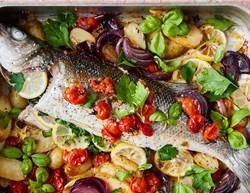If you’re one of the many health-conscious folks that take fish oil supplements to boost your heart health, listen up! According to a just-published JAMA Cardiology meta-analysis, you may be wasting your hard-earned cash.
To come to this finding, researchers pulled data from 10 existing studies, collectively containing information on 77,917 participants who consumed daily marine-derived omega-3 supplements ranging from 226 to 1,800 milligrams. Women comprised nearly 39% of the research pool, and an average of 4.4 years of data was collected on each person. Compared to control groups, people taking omega-3 supplements were 7% less likely to die of coronary heart disease and 3% less likely to have a non-fatal heart attack. While this certainly sounds like a good thing, the study authors note that none of the associations reached statistical significance.
“The results provide no support...to use omega-3 fatty acid supplements for the prevention of fatal coronary heart disease or any cardiovascular disease in people who have or (are) at high risk of developing cardiovascular disease,” the researchers wrote.
These findings are consistent with The 2016 European Society of Cardiology and European Atherosclerosis Society guidelines for prevention of cardiovascular disease, which indicate that it’s debatable whether omega-3 supplements protect against coronary artery disease.
Why is eating fish so much better than popping a pill? For one, you can’t be sure that supplements contain as much of a given nutrient as their labels claim. But there’s also another compelling reason: “Food, such as salmon, offers more benefits than just omega-3s. It has protein, B vitamins, potassium and more. When taking a supplement, a person is only getting that specific nutrient. For this reason, the body processes supplements differently—and often, less effectively—than real food,” says dietitian Sarah Koszyk. Koszyk’s sentiments are consistent with recent research that suggests that a combination of omega-3 fatty acids and other nutrients in fish may actually be responsible for the heart-protective perks.
Another thing to consider: Some of the benefits of eating fatty fish like salmon and tuna twice a week (the current recommendation) may inherently come from the fact that when people eat fish, they're not eating as much saturated fat from red meat or processed meats which contain less-beneficial fats and a lot of salt, says dietitian Rebecca Ditkoff.
So if omega-3 supplements can’t keep your ticker strong, what can you do to ward off heart disease? And what if you don’t like fish, or follow a diet that doesn’t allow for the consumption of marine life? Then what? Here’s everything you need to know:
Q: Exactly how much fish should I be eating?
“To get the recommended amount of omega-3s, eat two, 4-ounce servings of fatty fish per week,” Ditkoff says. If you miss the mark on occasion, Ditkoff says supplements can be an appropriate "insurance policy."
Q: What type of fish should I be eating?
Anchovies, wild salmon (canned or fresh), tuna (canned or fresh), herring and mackerel are all good sources of fatty fish, says Koszyk. “Eat swordfish and tilefish less often. They have higher mercury levels.”
Something else to keep in mind: Consuming other heart-healthy foods can also help protect your ticker. “The Mediterranean diet, which has been shown to protect against heart disease, includes fish, but also promotes other healthful foods—including plenty of vegetables, fruits, beans, olive oil, and nuts,” Ditkoff says. “The foods eaten in a typical Mediterranean diet together as a whole may also have synergistic effects that may be beneficial for heart health.”
Q: I don’t eat fish. How can I be sure I’m getting enough omega-3s?
“Adding walnuts or ground flaxseed to salads, cereals, and yogurt is a simple way to up your consumption of healthy omega-3s,” says Ditkoff. Women over 19 should aim for 1.1 grams of omega-3s daily. A mere 2 tablespoons of ground flaxseeds provides 2.9 grams of the nutrient and 1/4 cup of walnuts contains about 2.7 grams.
You could also make an omega-3 rich salad dressing by whisking together 1/4 cup walnut oil, 2 tablespoons sherry vinegar, 1/2 teaspoon Dijon mustard, and a pinch of salt.
Another option for vegetarians and vegans: algae and seaweed, says Koszyk. “Snack on dried roasted seaweed snack packs or use algae oil for cooking stir-frys, making salad dressings, or cooking veggies or proteins.”
Another tasty idea? “Crumble nori and use it in a Caesar dressing for anchovy-like undernotes,” suggests Olivia Roszkowski.
The bottom line.
Unless your doctor says otherwise, you likely don’t need to spend money on pricey supplements. You’re better off working out and eating a wholesome diet (as outlined above) so you can maintain a healthy weight and ward off conditions that increase your risk for heart disease. (Like diabetes and high blood pressure.)
“The major take-away from this study is that there is no magic pill. Living a healthy lifestyle is the best disease prevention,” Koszyk says.



.jpg&h=90&w=90&c=1&s=1)






